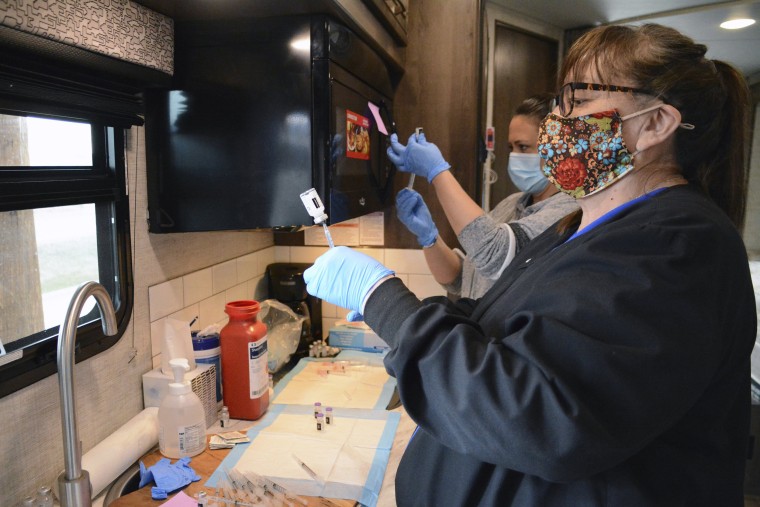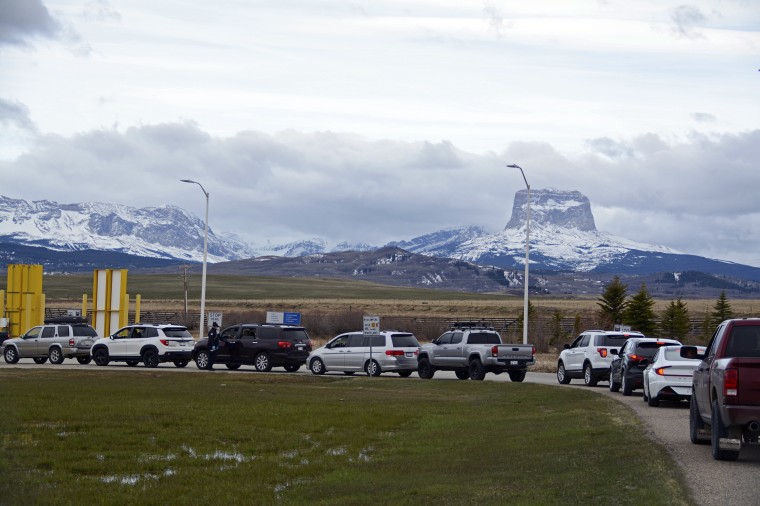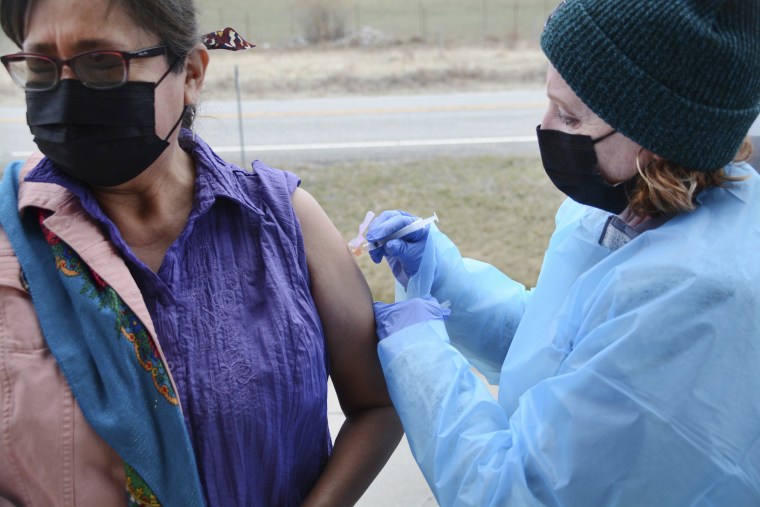The darkest days of the pandemic stretched through the fall, when ambulances were frequently called to transport tribal members of the Blackfeet Nation, whose lands border the snow-capped mountains of Glacier National Park in northern Montana, to hospitals two hours away.
While about 10,000 people live on the tribe's sprawling reservation, which is larger than the state of Delaware, the effects of the coronavirus were acute: Tribal health officials recorded more than 1,390 cases of Covid-19, including nearly 50 deaths.
But now, the tribe is boasting a remarkable feat in its fight against the virus: Roughly 98 percent of the reservation's eligible population has been fully vaccinated against the disease, compared to about 40 percent of Montana's total population and 41 percent of the U.S. population, according to the latest federal health data.
Vaccination efforts have been so successful that the tribe has gifted surplus vaccines to fellow Indigenous tribes in Canada and nontribal Canadians during vaccination drives that attracted hundreds of people each day, and the tribe will be providing shots at a two-day mobile vaccination site next week at a port of entry that connects Montana with the province of Alberta, said Robert DesRosier, the emergency services manager for the Blackfeet Nation. Anyone — Canadians, other travelers and tourists who may be visiting Glacier National Park — can roll up their sleeves and get vaccinated.
Full coverage of the coronavirus outbreak
"When the vaccines came along, they were a breath of fresh air," DesRosier said. "After all those dark days, when the pandemic was right in front of us and people were passing away and you couldn't even say goodbye, now we're doing everything we can to protect ourselves and anyone else who asks. There's a light at the end of the tunnel."
Drastic measures
But getting to this point has been a challenge, DesRosier said, requiring buy-in from tribal members in the face of vaccine hesitancy rooted in historic mistrust of the federal government and centuries of violence and abuse.
As Covid-19 ravaged Native American communities at disproportionate rates across the United States, due in part to longstanding health disparities and the lack of infrastructure and medical access, the Blackfeet Nation heeded the warnings about the virus's spread with stringent lockdowns, remote learning for schools, social distancing rules and mask requirements.
The tribe's Business Council took the drastic step of closing its eastern entrance to Glacier National Park for the 2020 tourism season — sacrificing economic revenue in favor of guarding public health.
"You could have heard a pin drop, that's how quiet it was," tribal spokesman James McNeely said.
It seemed to work: For more than 100 days, the tribe had no recorded cases of Covid-19. But by mid-October, as the coronavirus struck states in new hot spots across the country, with rapid spreads in the Plains and Midwest, where government rules on social gatherings were more lax, the Blackfeet tribe was no longer protected by its fortified bubble and logged nearly 400 active cases.
The tribe used incentives, such as cleaning supplies and gift cards, to encourage people to get tested.
A Centers for Disease Control and Prevention report in April that examined the Blackfeet Nation's use of stay-at-home orders and mask mandates — far stricter than state guidelines — found that they were beneficial, contributing to a "33-fold reduction in Covid-19 incidence" from the tribe's October peak to a month later.
Other tribal communities in Montana instituted similar restrictions after they experienced the toll that the coronavirus was taking: While Native Americans represent about 7 percent of the state's population, they made up more than one-third of Covid-19 deaths, according to state health data.
"We stood out as a tribe because we made some bold statements," DesRosier said. "Word got out that we're taking it really seriously."
Making inroads
That resolve carried on once the vaccines arrived in the end of December.
Indian Health Service, the federal agency that provides public health services to federally recognized Native American tribes and the Alaska Native population, delivered Covid-19 vaccines to more than 350 tribal health programs and urban Indian organizations. As of June 1, the agency has helped to administer more than 1.3 million doses.

Indian Health Service spokeswoman Jennifer Buschick said Friday that the agency's work to address the barriers to vaccine accessibility and vaccine efforts "have been successful despite the predominantly rural and remote locations [the agency] serves and the infrastructure challenges those communities face."
The Blackfeet Nation, as well as the Fort Belknap Indian Reservation, where the Nakoda and Aaniiih tribes reside, have among the highest vaccine administration rates within the agency's health system in Montana, Buschick confirmed.
Fifty-eight percent of eligible members of Fort Belknap are fully vaccinated through the Indian Health Service, while 35 percent of the Blackfeet Nation are fully vaccinated through the agency. The Blackfeet Nation's total vaccination rate also includes doses provided through the state of Montana.
For the Blackfeet Nation, the response to the vaccinations was overwhelmingly positive: By early March, more than half of residents received at least one dose of a vaccine. In addition to offering inoculations at local hospitals and clinics, health care workers hit the road with a mobile command vehicle stocked with vaccines.
Download the NBC News app for full coverage of the coronavirus outbreak
Other tribes have seen their people clamoring for vaccinations, including in the Navajo Nation, the largest Native American tribe by enrolled population. Navajo officials said last month that more than 70 percent of eligible tribal members who get their health care through Indian Health Service are now fully vaccinated.
Native American groups have stressed that while citizens largely remain skeptical over federal government policies, vaccination campaigns of going door to door in rural and remote areas have helped reach more people. Tribal health care workers are also taking the time to have conversations centered around how the vaccines can stave off deaths, particularly among older members, and therefore preserve tribal culture and language.
DesRosier said other communities hoping to replicate what the Blackfeet Nation has done must make inroads to combat misinformation, even as vaccine hesitancy continues to be fed, in part, by false claims and conspiracies on Facebook and rampant politicization.
"It's shameful that politics have gotten involved with the vaccines," he added. "This is about saving lives."
Paying it forward
Earlier this spring, the Blackfeet Nation's achievement in vaccinating members allowed it to share its excess doses north of the border. It worked with its counterparts within the Blackfoot Confederacy, a collection of Indigenous communities that includes the Blackfeet in Montana and three other tribes in Canada that have a shared language.
At the time, vaccination rates in Canada lagged behind the United States because of its limited supplies. (Almost 6 percent of the Canadian population has been fully vaccinated, according to the latest health data.)
Last year, the Blackfeet Nation was in desperate need of personal protective equipment amid a nationwide shortage, and the Blackfoot Confederacy in Canada, which had ample supply, stepped up. Giving vaccines was the Blackfeet's way "to repay the gift," Bonnie Healy, the Blackfoot Confederacy's health director, said.
A partnership among the various tribes, Canada's health departments and U.S. Customs and Border Protection helped get more than 1,300 Canadians vaccinated.

During the first vaccination clinic in April, Healy said, there were extra first doses of the Moderna vaccine, which led the Blackfoot Confederacy to open up the initiative to nontribal Canadians as well. By the time the Blackfoot Confederacy organized a second vaccination clinic, also allowing nontribal people to participate, hundreds of people from around the region showed up. The line of cars reached 6 miles long, and many had to be turned away.
While race relations between the tribes in southern Alberta and local communities remain fraught, Healy said, the vaccination clinics made possible by the Blackfeet Nation have helped ease some of the tension with the way the tribes have "paid it forward."
"We had people crying and just so grateful to be having the opportunity to get this vaccine," Healy said.
Similar alliances have sprouted up along the U.S.-Canada border in recent weeks, including the state of Alaska sharing vaccines with residents of British Columbia and North Dakota agreeing to vaccinate truckers from Canada.
With more Canadians and tourists getting vaccinated, Blackfeet tribal member Nathan St. Goddard said he is ready for the rush of travelers to the area this summer and is optimistic for a turnaround after a busy Memorial Day weekend.
St. Goddard, who runs Johnson's of St. Mary, a campground and restaurant catering to those visiting Glacier National Park, lauded the Blackfeet's vaccination campaign for "doing a good job to dispel any rumors" about vaccines. He didn't delay getting vaccinated.
"There's a light at the end of the tunnel."
Now, he said, he's hoping the tribe will consider further easing its Covid-19 restrictions given that herd immunity — the idea that enough people are immunized to stop the transmission of a virus — has been reached among the Blackfeet Nation.
McNeely, the tribal spokesman, said Thursday that he doesn't anticipate the current mask mandate will be lifted until the vaccine is approved for those younger than 12. He's pleading for a little more patience.
"A year from now," he estimated, "we'll be back to the full normal."



